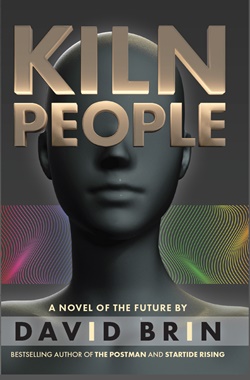Unless you’re a more-than-casual reader of science fiction, you’ve probably only indirectly heard of David Brin. Indirectly because he was the author of the excellent book The Postman, which was made into the significantly-less-than-excellent movie The Postman. This is unfortunate for many reasons, not least of which is that the book really is a classic work of science fiction that ought to be read; while the movie is a classic work of garbage that ought to be watched only as a cautionary tale for aspiring filmmakers.
Kiln People is definitely closer to the book The Postman than to the movie The Postman, but it’s a long ways from being another essential classic of sci-fi. That said, it’s still a solid and thoughtful read that only stumbles a bit at the end as it wanders into some silly quasi-mystical speculation. Spoilers abound through the rest of the review.

Albert Morris is a soft-boiled detective in an time when the popular technology of choice is ‘dittoing,’ or making a clay copy of yourself that lasts only a day but which carries an authentic soul imprint and can perform any one of a number of functions (complete with gimmicky modifications to the baked copy). At the end of the ditto’s 24-hour lifespan, the copy returns home and uploads its memories back into the original. The process can be repeated as many times as the original desires/can afford, with modifications to the baked clay body that include everything from increased mental focus with decreased appetites (the “ebony” copies) to increased appetites with decreased mental reservations (the “ivory” copies). In addition to being a detective, Albert Morris makes very-nearly perfect “dittos”, which he then dispatches do facilitate his detective work. This particular story focuses on two ‘grey’ dittos, who are nearly-human in their physiology and mental capabilities, and one ‘green’ who is created to do chores and perform mundane daily tasks.
Morris is hired to investigate the death of one of the founders of Universal Kilns, the inventors of dittoing technology. Hijinks ensue, and we eventually learn that the victim was killed by one of his own dittos (see? told you there’d be spoilers), who has found a way to imprint his soul not just on a copy built of clay, but on the fundamental structure of the universe itself. The problem is that uploading such an imprint requires the energy released from the sacrificial death of millions of innocents via a biological weapon, because that’s how quantum physics works apparently. The human original had hangups like conscience and fear, but his ditto decided to remove the original and go ahead with his plan to become a god. Will Morris and his dittos put together the pieces and stop the mad scientist from killing lots of people on his quest to ascend?
Along the way, Brin gives us a few interesting reflections on the nature of the relationship between the soul and the body (what does it mean to copy yourself into a constructed object?), as well as the place of God in the universe. he also gives us not a few silly platitudes that aren’t really worthy of a writer as thoughtful and competent as David Brin. To be fair it’s not always possible to tell what arguments Brin is genuinely making, and what are just the ravings of his trippy characters. For example:
Technology. That’s what made things better! In fits and starts–and often horribly abused along the way–that’s where we found answers that were consistent, dependable, uncapricious. Answers that applied to lord and vassal alike. Answers that improved life across the board and never went away.
So, why not use technology to solve the greatest age-old riddle–immortality for the soul? (pg 378)
This is of course rubbish. Technology is a multiplier, nothing more. It is a tool that can bring out something that is already there on an increasingly large scale, but it is not an end in-and-of itself. At root is always going to be the person using the technology–not the technology itself. What’s ironic is that Brin’s book is a great fictional example of this. Some people use their dittos as means to enhance their own lives and to serve others; other people use their dittos to self-aggrandize; and others commit acts of horrendous evil. We do the same thing with a hammer, albeit on a much smaller scale.
Even with these moments of trite shallowness, the book still raises interesting questions about the nature of the soul and its relationship to the body. Is the soul nothing more than an electrical current? If so, then conceivably it could be copied, and even imprinted on something else (a golem made of clay of course, might not be our first choice). If the soul is an electric current, that raises further questions about the relationship between the individual and the mass of mankind–are we all different aspects of one current running through some kind of planetary grid? Or are we solitary bolts of lightening separate from everyone else, however close we may be in time and space otherwise? (Clearly, I’m not an electrician…) In addition to these reflections, we see in the background of the story occasional commentary on the effects of this developing technology on society, and on the social unrest and upheaval that results from such a massive advancement. If anything, more of this kind of reflection would have been interesting–but the book was already 450+ pages. So maybe we should just leave well enough alone.
Kiln People is probably a hundred pages longer than it needs to be. And the various villains’ motivations are all a bit shallow. But this is still a good, solid, read, and worth at least a once-through.
Dr. Coyle Neal is co-host of the City of Man Podcast and an Assistant Professor of Political Science at Southwest Baptist University in Bolivar, MO. One of him is probably enough.













